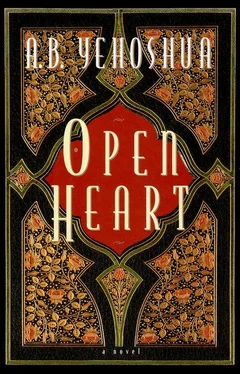A. Yehoshua - Open Heart
Здесь есть возможность читать онлайн «A. Yehoshua - Open Heart» весь текст электронной книги совершенно бесплатно (целиком полную версию без сокращений). В некоторых случаях можно слушать аудио, скачать через торрент в формате fb2 и присутствует краткое содержание. Год выпуска: 2014, Издательство: Peter Halban, Жанр: Современная проза, на английском языке. Описание произведения, (предисловие) а так же отзывы посетителей доступны на портале библиотеки ЛибКат.
- Название:Open Heart
- Автор:
- Издательство:Peter Halban
- Жанр:
- Год:2014
- ISBN:нет данных
- Рейтинг книги:3 / 5. Голосов: 1
-
Избранное:Добавить в избранное
- Отзывы:
-
Ваша оценка:
- 60
- 1
- 2
- 3
- 4
- 5
Open Heart: краткое содержание, описание и аннотация
Предлагаем к чтению аннотацию, описание, краткое содержание или предисловие (зависит от того, что написал сам автор книги «Open Heart»). Если вы не нашли необходимую информацию о книге — напишите в комментариях, мы постараемся отыскать её.
Open Heart — читать онлайн бесплатно полную книгу (весь текст) целиком
Ниже представлен текст книги, разбитый по страницам. Система сохранения места последней прочитанной страницы, позволяет с удобством читать онлайн бесплатно книгу «Open Heart», без необходимости каждый раз заново искать на чём Вы остановились. Поставьте закладку, и сможете в любой момент перейти на страницу, на которой закончили чтение.
Интервал:
Закладка:
Two or three minutes after the train left the yellowish hell of the station and, as if suspended in the air, began crossing the pitch-black river, the door of the compartment shook with a violent knock, which so alarmed the Indian passenger that the newspaper fell from his hands. Through the little round window in the door I saw Lazar’s familiar gray mane again, and I hurried to open it and found both of them squeezed into the passage with their two suitcases. Lazar’s face was gray with exhaustion, and his eyes guiltily evaded mine. Even before stowing the suitcases on the racks, he admitted his failure. First of all he clasped my shoulders, then he clutched his head between his hands and began shaking it. “I don’t know what happened to us,” he said despairingly, “I don’t understand how we could have lost our way like that.” But his wife burst into loud, uninhibited peals of relieved laughter, astonishing the elderly Indian, who now folded his newspaper and put his cracked glasses away in his pocket in order to gaze at this boisterous woman. Her topknot had unraveled completely and her hair was falling onto her flushed, heavy face, from which all traces of makeup had vanished. They had apparently suffered an hour of extreme anxiety and were now overjoyed at having found me. Lazar kept on apologizing; as someone who knew how to blame others, he now seemed eager to take the blame upon himself, but also to explain exactly how and where they had gone wrong and to apologize again for the worry they had caused me. It turned out that they too had tried to call Israel, but nobody had warned them about the length of time it would take until the connection was made. “Enough already, what does it matter?” his wife interrupted him, annoyed by his repeated apologies. “The doctor wasn’t worried, believe me. He would have gone on ahead and we would have arrived a day later. I’ve already told you, he’s not the type to get lost.” She said this in a gentle but slightly mocking tone, and began combing her hair in front of the little mirror in the corner of the compartment, smiling at Lazar indulgently as she did so. When she had finished combing her hair, she bestowed a warm smile on the old Indian too, who hadn’t taken his eyes off her, picked up the cup of tea standing on the tray by her seat, and started to sip it with her eyes closed. Only now did Lazar begin to calm down. He started rearranging the luggage on the racks, tugging and pushing, and a little while later, when the steward brought us the ready-packed meals included in the price of our tickets, he sat down and ate heartily.
In the meantime his wife was already discreetly questioning the Indian about the purpose of his trip, and he responded willingly in reasonable English and also gave her his card. He was an official in a government department in New Delhi who had recently retired and was on his way for the first time in his life to Varanasi, in order to bathe in the Ganges before he died and to take part in the cremation rites for his eldest brother whose body would be taken there from the south by his sister-in-law and nephews. Every time he pronounced the words “before I die,” Mrs. Lazar’s eyes lost their smile and her face clouded, as if she refused to countenance his thoughts of death even by listening to them. But she was wrong; the thought of death only gave the old Indian pleasure. Since nothing in the universe was ever lost, all that was left for him to do was to ensure his rebirth in more advantageous conditions, which he was now about to do by bathing in the holy river.
“Unbelievable — this man is actually convinced that someone is going to bring him back to life again after he dies!” Lazar exclaimed in Hebrew, his hunger satisfied and a good-humored smile on his face, which was still gray and exhausted. His breathing sounded heavy, and for a moment I was afraid that his heart wasn’t functioning normally. The Indian passenger fell silent, as if he sensed that he was being made fun of. Outside it was already completely dark, there was no light to signal any passing reality, and for a moment it seemed as if the train were standing still, even though its wheels were turning. Soon the Indian was listening with interest to Lazar’s wife as she explained the purpose of our trip. He did not seem surprised to hear that three people had come specially from Israel to take the sick girl home. Perhaps she has sunk into Nirvana, he said, absolutely seriously, and it will take much strength to pull her out of it. Toward midnight a young boy came to remove the dirty dishes, to pour tea, to distribute blankets, and to help us convert our seats into bunk beds. Lazar’s wife and I climbed into the upper bunks, and Lazar and the Indian lay down in the lower ones. We switched off the light and covered ourselves with our blankets, but I was afraid I would not be able to fall asleep with so many people surrounding me. Strangely enough, the presence of the old Indian official below me seemed to reassure me. My face touched the dark blanket. I strained my eyes until I began to make out the outlines of the reality beyond the window — poor peasant houses and desolate dirt roads. Here and there I thought I could see a man plowing in the fields, and I asked myself whether a new day had already begun for him or the old one had not yet ended. From time to time the train slowed down at little country stations, gliding silently past the shadowy, blanket-wrapped figures that crouched next to the tracks and avidly examined the passing train. Lazar’s wife fell asleep immediately and began to snore, but Lazar was still tossing and turning on his narrow bunk. Every now and then he got up and put his hand on his wife to stop her snoring, but his touch only succeeded in interrupting her snores for a few minutes, after which they began welling up again, gently but strongly. Finally he woke her up. “Dori,” he whispered firmly, “Dori, you’re disturbing everybody.” She woke up, raised herself slightly, looked around in confusion, saw me, nodded at her husband as if agreeing with what he had said, and sank back into a deep sleep, carrying me off with her.
Lazar was clearly as resistant to sleep in trains as he was in planes. When I woke up at dawn, stunned by the clamor of the wheels, which my deep sleep had succeeded in suppressing, I saw him sitting heavily on his low bunk, sad and lonely without his smiling wife at his side. The moment he sensed that I had opened my eyes, he tried to latch on to me. Although I would have been happy to go on snuggling into my warm, narrow bunk, I felt his distress and climbed down to talk to him. It transpired that he had spent most of the night sitting up in bed or prowling around the train. He had even managed to wash and shave. He was too tense to fall asleep, or even to read. Worry about the state in which he would find his daughter was eating him up, and he was preoccupied too by interrupted business at the hospital. I took the opportunity to ask him about his work, and he responded willingly, but suggested we continue our conversation in the corridor. There was no need to disturb those who always managed to sleep in spite of everything, he said with a smile, and I didn’t know if he was referring to his wife or if he also had in mind the old Indian, who had curled up into a little white ball on half his bunk, as if rehearsing the fetal position in anticipation of his rebirth. In the corridor of the train, which was now racing through reddish hills, I began interrogating Lazar about the hospital, discovering through his administrative point of view new and surprising things even about the surgical department, which I thought I knew so well. Although he was not familiar with the professional medical aspects of our work, he had a surprisingly good grasp of the way the department was organized, and he was astonishingly well informed about the personal lives of the doctors and nurses. He had something to tell me about everyone whose name I mentioned, and was quick to express an opinion or assessment of them as well. Sometimes he added a story about a power struggle which had ended in success or failure. I suppose he knows all about me too, I thought to myself, and perhaps he even has an opinion of my abilities, which he got from people whom I would never have imagined took the trouble to think about me, but he’s too discreet to drop me a hint. I asked him about plans for the future, hoping to hear of new openings, but he sighed and began throwing out figures about budget cuts, which were doubly painful in the light of his desire to expand by constructing buildings with two operating rooms and up-to-the-minute laboratories, for example, whose future location he sketched in the air with broad movements.
Читать дальшеИнтервал:
Закладка:
Похожие книги на «Open Heart»
Представляем Вашему вниманию похожие книги на «Open Heart» списком для выбора. Мы отобрали схожую по названию и смыслу литературу в надежде предоставить читателям больше вариантов отыскать новые, интересные, ещё непрочитанные произведения.
Обсуждение, отзывы о книге «Open Heart» и просто собственные мнения читателей. Оставьте ваши комментарии, напишите, что Вы думаете о произведении, его смысле или главных героях. Укажите что конкретно понравилось, а что нет, и почему Вы так считаете.












